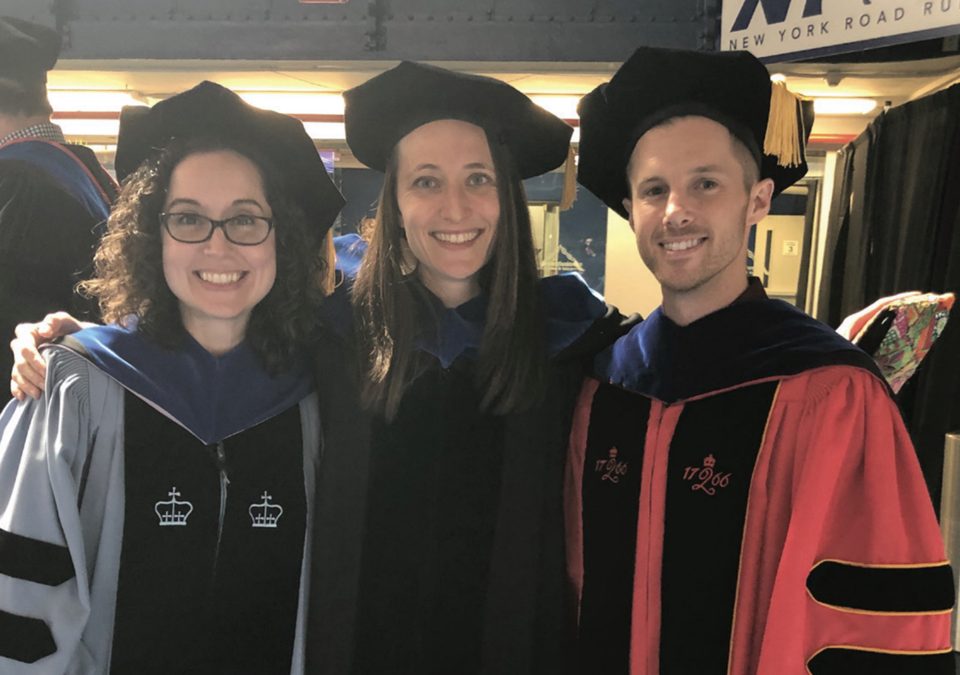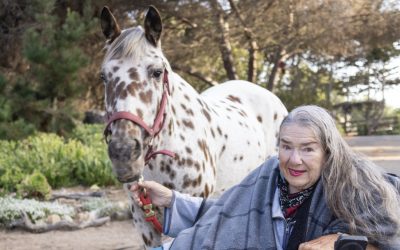On a recent visit to her hometown, Dr. Morgan Philbin wrote a Viewpoint article for The Tribune questioning Cal Poly’s plan for safeguarding returning students during the COVID-19 pandemic. Citing statistics from other universities where rates shot up when students returned, Dr. Philbin wrote, “What is Cal Poly doing to ensure that its outcome will be different? Sadly … I don’t believe it’s doing enough.” Morgan’s assessment is personal as well as professional. She comes from a family that includes over ten Cal Poly graduates and faculty.
Morgan graduated from San Luis Obispo High School in 2000, where she ran varsity track for three years and played soccer and water polo, as well as participating in choir and band. She earned a degree in psychology, and government and international relations, at Wesleyan College in 2004. After a year in China, she enrolled at Johns Hopkins University where she completed her Masters in Health Science in 2007, including a year of fieldwork in Tijuana, and her Ph.D. in 2013, including another year in China in 2007-08.
Morgan completed her post-doctoral work at Columbia in the Division of Gender, Sexuality and Health, the HIV Center for Clinical and Behavioral Studies. She is in her fifth year as a teacher and researcher at Columbia. Quoting from a short biography on the Columbia Population Research Center website, Morgan “has worked for fifteen years conducting mixed methods research that explores how institutional and policy-level factors become integrated into the daily lives of racial and sexual minority youth.”
My interview with Morgan took place in my backyard, which is over the fence from the home of her ninety-eight-year-old grandmother, Vera Philbin, who Morgan visits regularly when she is in town. Vera became a widow with eight children when her husband, a Cal Poly engineering professor, died in a small plane accident during Poly Royal in 1968.
Most of the Philbins remained in the county. Morgan’s father, D.K., is a retired Hancock College chemistry teacher. Her mother, Judy, arrived in San Luis Obispo with her family when she was six. She worked for Ziatech and then Intel, the company that bought Ziatech from the Forbes family. D.K. and Judy have been members of choir director Gary Lamprecht’s Vocal Arts Ensemble for decades. Morgan has dedicated her career to HIV research, an interest that started as an undergraduate. “I worked with different organizations around sexually transmitted disease education for high school students. It felt as if HIV was still a huge issue but that people had moved on from it. HIV was still spreading rapidly in certain communities. The
attention a disease gets is directly related to who is most affected by it. As HIV moved into less affluent communities, to communities of color, to people who injected drugs, less attention was paid to it.”
“But,” Morgan said, “the issue is far more complex than just dealing with the disease. We know that HIV is spread by drug use, by sex, but actually it is spread by social inequality. If you’re a gay adolescent who has been kicked out of the house your risk becomes greater because there’s much more HIV in that population. It’s a different world for them that frequently includes poor education and the unavailability of jobs.
“From a social justice and an intellectual perspective, I’ve thought about what drives the continued spread of HIV, the broader social context in which people live, and how that contributes to it. Like addiction, it’s a health issue, not a moral failing. We have to give people a chance to start on an equal playing field. If you don’t have a place to live, if you’re hungry, if you’re a transwoman subject to attack or being killed, HIV is not the biggest problem. In an imperfect system, we use HIV to create a broader wraparound set of support services.”
Morgan studied Chinese in college, and, after being fascinated by a summer she spent in China as an undergrad, returned to China after graduation. “I worked for a non-governmental agency, focusing mostly on young people. The government had only just recognized that HIV existed two years before. They weren’t getting treatment to people; they weren’t letting the media report it. Members of the organization I worked for were regularly detained, put under house arrest. I was twenty-two. I had no power. But as the only foreigner people thought I could fix things for them. That’s one of the reasons I went back to graduate school, so I could develop the skills to help.”
The second time Morgan worked in China, after completing her Masters, she had a Fulbright Fellowship, and she was able to set up her own program. Her focus was on intravenous drug users. She worked in Yunnan Province on the Myanmar border. “It was more straight research. The government was scaling up methadone clinics, but there hadn’t been any assessment of how well they worked. They were allowing needle exchange programs, but they refused to fund them.”
“Given how Draconian the Chinese government is, where selling drugs could still be punishable by death, I wanted to find out if the drug users would even engage in HIV services. I interviewed users and stakeholders, like the people running the programs, people at the United Nations and other international services. I spent time doing interviews and living at a drug rehab center.”
The biggest issues that came up were fear of the police and concerns about methadone use. When I asked Morgan if, given their fear, people were willing to communicate with her, she said, “At first I thought they wouldn’t, but it ended up being the opposite. They saw me as someone who was taking this information back to the United States, that I had some agency to get the information to someone who could fix it. I could sit with them and ask, ‘Tell my about your life. What makes this hard? What can we do to make this easier for you?’”
The hope is that the research Morgan and her colleagues do, the data generated in places like China, Tijuana, Baltimore, and now in New York, will influence policy and benefit those with HIV.
“People think we do the work and generate the data and then it’s someone else’s job to go fight for it. I’m not trained as a policy advocate or a lobbyist. But our department at Columbia has done a really good job insuring that our data are used in Congressional testimony, at the Center for Disease Control and the National Institute of Health, for example.”
“The ethics of the research come into question if we’re asking someone who is already vulnerable and marginalized to spend their time with us, to tell us what is hard for them, and then it goes nowhere. It can be infuriating at times when politicians, for example, don’t think of these issues as something that matters to them or their constituents. A lot of change is happening on the local level in cities like San Francisco, New York, Chicago and Philadelphia. San Luis Obispo has a great program working on overdose prevention and needle exchange.”
In addition to all of her important research, Morgan loves teaching. She cares about the emotional condition of her students. “The step-father of a student from Buellton was diagnosed with leukemia. I’ve driven down there a couple of times just to go for a walk with her to see how she’s doing. Life is hard enough. Grad school is hard. I want students to know they have support, that they are welcome and have earned the right to be at Columbia. I hug my students.”
Whether it is HIV, intravenous drug use or opioid addiction, Morgan’s overarching approach to public health is harm reduction. “Teenagers are going to have sex. Provide condoms. If you’re going to inject drugs, use a clean needle. We know telling people not to do something doesn’t work. If you tell someone they’re a bad human, they’re never going to ask for help. We can’t solve problems by giving directives.”
At the end of our conversation, Morgan shared an experience with a client in Baltimore and the outcome of being able to provide services that changed her life. “The job of a researcher is to amplify the voices of the people who are experiencing something. I get to know my clients really well. I worked with Charmaigne, a twenty-two-year-old with four children. I met her through the Johns Hopkins HIV clinic in 2009. She was HIV positive. We’re still close. She now works for an HIV organization. She has fought for better housing, for better health care. She was involved with PTA at school, a great advocate for her children. She knew she was smart, she knew she was capable, she needed support and with it I have watched her thrive. “Science and research is not just putting needles in people and number crunching.
Science is understanding the lived experience of people. COVID is an example. We can flash the numbers, 180,000 dead, but what does that mean? We have to share stories, what it was like to be on a ventilator, to lose a parent. That will allow us to understand the impact of our policies on people’s lives. We have to include the voices of the communities where people are being affected. I never want to forget; there are people behind all of this.”





